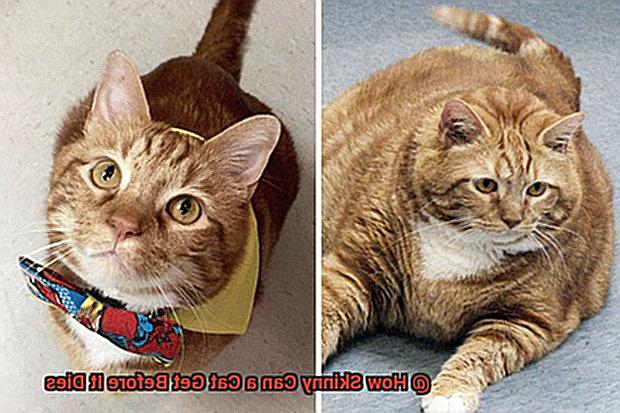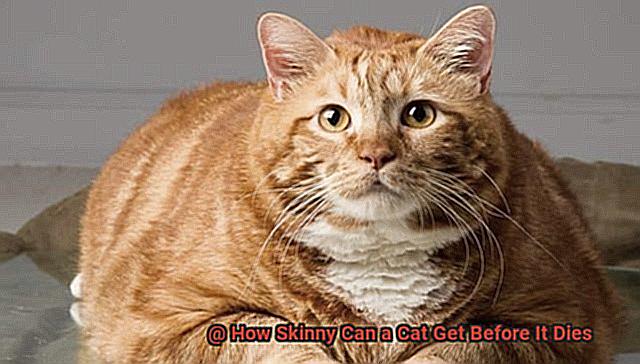Cats are more than just pets; they are members of our families. They bring us endless joy, comfort, and companionship. However, when our feline friends become too thin, it can be a cause for concern. As a cat expert, I have seen firsthand the negative effects of severe underweight in cats. The question on every cat owner’s mind is: how skinny can a cat get before it dies?
Unfortunately, there is no one-size-fits-all answer to this question. Several factors contribute to a cat’s weight loss, including genetics, diet, and underlying medical conditions. While cats are known for their agility and speed, they can suffer from a lack of appetite that leads to emaciation and severe health problems.
In this article, we’ll explore the dangerous line between healthy weight and being dangerously underweight in cats. We’ll discuss the telltale signs of an underweight cat and the potential health consequences that come with it. Moreover, we’ll provide you with actionable steps to help your furry friend regain their lost weight.
As a responsible pet owner, it’s crucial to be mindful of your cat’s dietary needs and overall health. By reading this article, you will learn why not taking your cat’s weight seriously could result in dire consequences for your beloved pet. So sit back and relax as we dive into the importance of maintaining your feline friend’s healthy weight.
What Factors Impact a Cat’s Health and Lifespan?
To achieve this, it’s crucial to understand the factors that can impact your cat’s health and lifespan. These range from their genetics to environmental factors.
One of the most significant factors that can impact a cat’s health is nutrition. As obligate carnivores, cats require a diet high in protein and fat to thrive. Feeding your cat a diet that is too low in protein can lead to weight loss and malnutrition, which can have detrimental effects on their overall health and lifespan. Therefore, it’s essential to provide your cat with high-quality, balanced meals that meet their nutritional needs.
Exercise is also essential when it comes to your cat’s health and lifespan. Providing ample opportunities for exercise can help keep your cat physically fit, maintain a healthy weight, and prevent obesity-related illnesses. This can include providing toys for playtime, scratching posts for climbing, and even taking your cat for walks on a leash.
Access to clean water is another critical factor in maintaining your cat’s health. Clean water is essential for proper organ function and preventing dehydration. Ensure your cat always has access to fresh, clean water in a bowl that is changed regularly.

Regular veterinary care is vital for maintaining your cat’s health and detecting any potential issues before they become serious. Routine check-ups can help prevent illnesses, monitor weight changes, and ensure your cat is up-to-date on vaccinations.
Finally, environmental factors such as exposure to toxins or disease can impact a cat’s health and lifespan. Outdoor cats may be exposed to toxins such as pesticides or chemicals that can be harmful or even fatal. Similarly, exposure to diseases such as feline leukemia virus or feline immunodeficiency virus can impact a cat’s health and lifespan. By providing a safe environment for your furry friend, you can minimize the risks associated with these factors.
How Skinny Can a Cat Get Before It Dies?
Firstly, cats can survive without food for several days, but a lack of water can be fatal within a few days. When a cat goes without food for an extended period, their body will start breaking down fat reserves for energy. However, if they go too long without food, their body will start breaking down muscle tissue instead of fat, leading to serious health problems and possibly death.
A healthy adult cat can lose up to 10% of its body weight without any negative effects. Yet, if a cat loses more than 10% of its body weight or is already underweight, it could be a sign of a severe underlying health issue. Common causes of weight loss in cats are dental problems, thyroid issues, kidney disease, and cancer.
If you notice your cat losing weight rapidly or appearing underweight, take them to the vet immediately. The vet can run tests to determine the underlying cause of the weight loss and recommend a treatment plan. Simple changes in diet or supportive care may be enough to help them regain their lost weight in some cases. However, in severe cases, additional medical treatment may be necessary.
The Role of Body Condition Score in Assessing a Cat’s Health
That’s where body condition score (BCS) comes in as a vital tool to evaluate your cat’s well-being. BCS helps assess your cat’s body fat and muscle mass, which can be used to identify potential health problems. In simple terms, it’s the key to keeping your cat healthy.

A BCS scale ranges from 1-9, with 1 being emaciated and 9 being obese. A healthy cat should maintain a BCS between 4-Assessing your cat’s BCS involves a visual and tactile examination of their body. This means feeling for bones and muscle tone, assessing their overall shape from above and from the side. Look for a visible waistline behind their ribs, easily felt ribs without being visible, and rounded hips without protruding.
A low BCS can indicate that your cat is not getting enough food or has an underlying health issue. If your cat is too thin, they may have a weakened immune system, making them more susceptible to infections and diseases. In severe cases, a cat may become so malnourished that they are unable to recover.
Regular monitoring of your cat’s BCS is critical in detecting potential health issues early on and taking steps to prevent serious illness or even death. This can be achieved by consulting with a veterinarian and providing appropriate nutrition and exercise. By keeping track of your cat’s BCS, you can catch potential health problems early on and avoid costly treatments later.
What Are the Signs of Severely Underweight Cats?
That includes keeping a watchful eye on their weight and overall health. Severely underweight cats can suffer from a host of health issues, so it’s essential to know the signs and take action.
One of the most obvious signs that your cat is severely underweight is visible bones and a significant loss of muscle mass. If you can easily see your cat’s ribcage or spine, it’s a clear indication that they need attention. Apart from that, lethargy and lack of energy are also common indicators of underweight cats. You might notice your cat seeming more tired than usual, disinterested in playing or engaging in normal activities, leading to decreased appetite and further weight loss.
Another telltale sign to watch out for is a dull coat and dry skin. This can stem from inadequate nutrition and hydration in their diet, which can also result in dehydration, leading to additional health problems.
It’s important to keep in mind that these signs can vary depending on the cat’s individual situation and the underlying cause of their weight loss. If you suspect that your cat is severely underweight, seek veterinary care immediately. Your veterinarian can diagnose the underlying cause of your cat’s weight loss and provide appropriate treatment.
What Are the Potential Health Consequences for Severely Underweight Cats?
One of the critical components of your cat’s well-being is maintaining a healthy weight. However, when a cat becomes severely underweight, it can lead to a range of potential health consequences, from mild to severe.
One of the most significant dangers of severe underweight in cats is malnutrition. When your cat does not receive enough essential nutrients, such as protein or vitamins, their body starts to break down muscle tissue for energy. This can result in muscle wasting, weakness, and a weakened immune system, making them more susceptible to infections. If left untreated, these symptoms can lead to serious health issues that may even be life-threatening.
Another potential health consequence of severe underweight in cats is anemia, which occurs when there is a low level of red blood cells in the body. This can cause fatigue, weakness, and even organ failure if left untreated. Severely underweight felines are also at risk of developing hypothermia as they may not have enough body fat or muscle mass to regulate their body temperature properly. This can cause their body temperature to drop dangerously low and lead to lethargy, weakness, and even death if not treated promptly.
Dental problems, skin and coat issues, and digestive issues like diarrhea and vomiting are also common in severely underweight cats. These symptoms can worsen their malnutrition and lead to more severe health problems if left untreated.
To prevent these potential health consequences, it’s vital to monitor your cat’s weight and nutrition closely. If you notice any signs of weight loss or malnutrition in your cat, seek veterinary care immediately to address any potential health consequences and prevent further complications.
xDDw1Dgk4D0″ >
Conclusion
To sum up, as a responsible cat owner, it’s crucial to keep a close eye on your furry friend’s weight and overall health. While there isn’t an exact answer to the question of how skinny a cat can get before it dies, it’s essential to pay attention to their weight and nutrition.
A healthy adult cat can lose up to 10% of its body weight without any negative consequences. However, if your cat loses more than this or is already underweight, it could be a sign of an underlying health issue. Therefore, monitoring your cat’s Body Condition Score (BCS) regularly can help you identify potential health problems early on and take preventive measures.
Maintaining your cat’s healthy weight involves several factors, including providing them with high-quality, balanced meals that meet their nutritional needs, plenty of opportunities for exercise, access to clean water, regular veterinary care and a secure environment.
If you suspect that your cat is severely underweight or shows any signs of malnutrition seek veterinary care immediately. Severely underweight cats are at risk for various health issues such as malnutrition, anemia, hypothermia, dental problems and digestive issues like diarrhea and vomiting.







